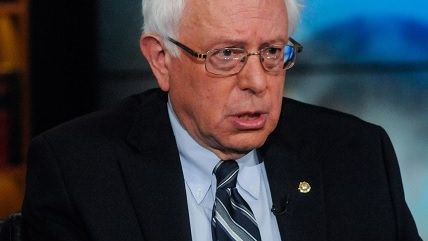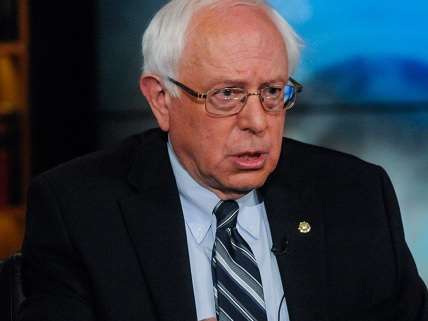Bernie Sanders Responds to Oregon Shooting: More Gun Control, More Mental Health, Less Violence in Media
Wants less shouting, more good policy.


Sen. Bernie Sanders (I-Vt.) joined the parade of politicians responding to the shooting at a community college in Oregon with their pre-selected political pronouncements before all the facts are even in. It's become a tradition. President Obama spoke last night while the media was still nailing down the name of the alleged gunmen.
Sanders posted his message to one of his Facebook pages. He has two, one for his Senate position and one for his presidential campaign. This was posted on his senatorial Facebook:
The American people are horrified by these never-ending mass shootings. Our hearts go out to the families and friends of the innocent victims. As a nation, we must do everything we can to put an end to this awful epidemic of senseless slaughter.
We need a comprehensive approach. We need sensible gun-control legislation which prevents guns from being used by people who should not have them. We must greatly expand and improve our mental health capabilities so individuals and families can get the psychological help they need when they need it. We also have to tone down the incredibly high level of gratuitous violence which permeates our media.
The shouting at each other must end. The hard work of developing good policy must begin.
Sanders has historically been more or less in favor of gun rights. While the state he represents, Vermont, has among the fewest gun laws in the country (and among the lowest rates of gun violence in the country), his position on guns is likely not just a matter of electoral expediency. As Jesse Walker noted, Liberty Union, the minor party of which Sanders was a member in the 1970s, opposed all gun laws.
Sanders' position on guns, then, is more of an artifact of his Old Left origins than mere political expediency. His position earned him the help of the National Rifle Association (NRA) during his first successful campaign for U.S. Congress, which in turn has yielded a line of attack for the other non-Clinton Democratic presidential candidates still stuck in low single digits.
Sanders has supported gun control measures before. While he voted against the Brady Bill, saying waiting periods for buying handguns were best left for the states, and for bills limiting the liability of gun manufacturers in lawsuits, Sanders also voted for the 1994 assault weapons ban and for expanded federal background checks.
Sanders' Facebook comment about keeping guns away from "people who should not have them," then, likely refers to more background checks. Oregon, where yesterday's shooting took place, passed a mandatory universal background check law earlier this year.
The rest of Sanders' comments are best understood when keeping in mind his differences with the Democrats' anti-gun orthodoxy. He mentions fixing the mental health system and the "gratuitous violence" in the mainstream media, both talking points previously deployed by the NRA.
The temptation to deflect the scapegoating of guns for violence by scapegoating mental health laws or violence in pop culture should be resisted. The truth about mental illness and guns is you can't predict who will become violent just based on perceived mental illness, so drawing the connection inevitably leads to large scale civil liberties abuses. Only 4.3 percent of the "severely" mentally ill ever commit any kind of act of violence, while the rate for the non-severely mentally ill is the same as for the "normal" general population. "The idea that mental health professionals can accurately predict which seemingly harmless people will turn violent has no basis in fact," Jacob Sullum wrote after the Sandy Hook shooting.
Which leaves the tired old canard about violence in pop culture. Even as ideological social science researchers insist media in the U.S. is getting more violent, rates of violence in the U.S. are actually going down, with younger social science researchers starting to question and debunk years of confirmation bias, as Ronald Bailey wrote earlier this year. And it's far from clear mass and pop culture are getting more violent in the first place.
Sanders wants less shouting and more good policy making, hard to argue with. But good policy making is easier said than done, and requires a divorce from just the kind of emotional drivers at play in the wake of tragedies. Hard cases make bad law, something learned over and over again.

Show Comments (112)